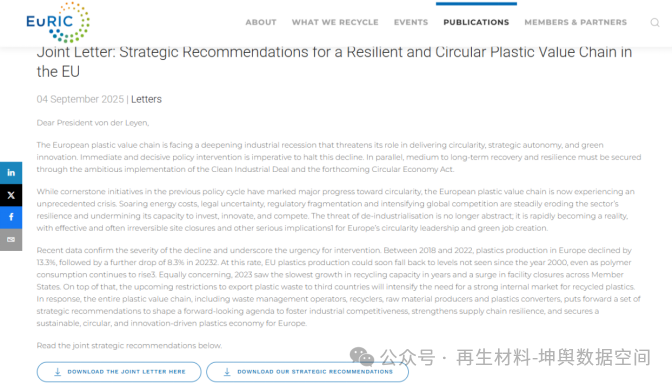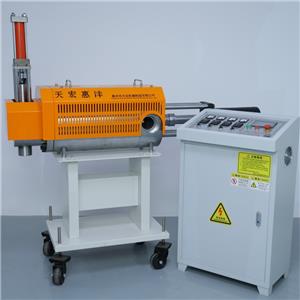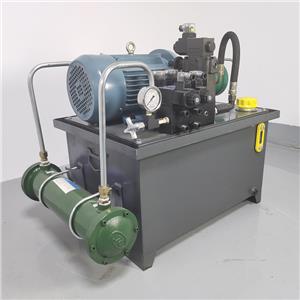Six Strategic Recommendations for the Plastics Industry Jointly Proposed by 28 European Institutions
In September 2025, 28 industry organizations from Europe's plastics value chain (including the European Plastics Converters Association, the European Recycling Association, PETCore Europe, Plastics Europe, and the European Plastic Recycling Association PRE, etc.) jointly submitted an open letter to Ursula von der Leyen, President of the European Commission, warning that Europe's plastics industry is in a deep recession and urgent policy intervention is needed to avoid industrial chain disruptions, loss of green investments, and large-scale job losses.

According to the data provided in the letter, between 2018 and 2022, plastic production in Europe decreased by 13.3%, and it dropped another 8.3% in 2023, which may fall to the lowest level since 2000. At the same time, the growth of recycling capacity has slowed down, and recycling facilities in several member states have been closed. The future measure of prohibiting the export of plastic waste to third countries will further increase the pressure on the internal market. The letter points out that the soaring energy costs, legal and regulatory uncertainties, administrative burdens, and intensified global competition are gradually weakening the resilience of the industry and hindering investment and innovation. The threat of deindustrialization has changed from a theory to a reality.
To address the crisis, the industry has jointly put forward six policy propositions.
Restore Fair Competition - Immediately Promote the EU Circular Plastics
Restore a fair environment by implementing reciprocal measures or alternative mechanisms for imported recycled polymers and plastic products; increase incentives for collection and sorting infrastructure, explore Green VAT and EPR rewards to boost investment; ensure high-quality standards and establish unified recyclable design criteria; reform public procurement to prioritize EU recycled plastics; and reduce incineration and landfilling to prevent waste from escaping the circular system.
Reduce energy costs - Empower the global competitiveness of recycled plastics
Strengthen the integration of circular and climate policies, provide support measures covering recycling, masterbatch, modification, and processing for the plastics industry to include it in the scope of NZIA, CISAF, IDAA, and CEEAG; offer affordable energy plans, tax relief, and emission-based funding; national aid (including operational subsidies) should focus on CO₂ emission reduction, resource efficiency, and circular utilization, and provide channels for small and medium-sized enterprises and existing enterprises; reinvest the revenues from ETS and the "Plastic Autonomous Resources" into a special competitiveness fund for circular utilization and waste management.
Eliminate loopholes in verification and law enforcement
Ensure that competent authorities (including customs) are equipped with sufficient manpower and resources to implement unified rules and market supervision; provide training, industry dialogue, and digital traceability tools for competent authorities; establish separate customs codes for fossil-based and non-fossil-based (bio-based, recycled-based, carbon capture) raw materials and products; establish a unified EU verification framework and streamlined third-party certification; conduct equal reviews of recycled content declarations, food contact compliance, and REACH regulation implementation for imported products, and ensure this through traceability standards and testing methods.
Addressing regulatory fragmentation - ensuring the uniform implementation and enforcement of EU law
Uniformly and consistently enforce laws within the EU; strictly implement recycled content targets, supplemented by third-party certification and penalties; ensure consistent interpretation of rules and enhance investment certainty; reduce administrative burdens by streamlining licensing and reporting processes; conduct unified compliance audits and formulate EU-wide "End-of-Waste" standards; in the field of food contact materials, the European Commission should increase resources to ensure that competent authorities conduct adequate audits, complete EU registration, and accelerate the approval of new technologies.
Break the deadlock - Promote innovation and private investment
Provide targeted support to drive the development of breakthrough technologies; establish a regulatory environment that reduces investment risks, accelerates innovation, while safeguarding existing production capacities; advance efficient collection systems and expand sorting and separation technologies; support all recycling technologies with priority given to sustainable ones; the EU needs to strengthen investment coordination, unify recycling and material rules, and clarify governance at the member state level to build a unified and competitive circular plastics market.
Optimize the EPR mechanism - build a fair circular market
Unify EPR rules, definitions, and ecological regulatory fees within the EU; reward recyclable design and recycled components in a material-neutral manner to address market failures; strategic governance should ensure full value chain participation (such as establishing advisory committees), and operational governance should maintain the independence of PROs; avoid "minimum compliance" caused by fee competition.
Finally, the joint letter emphasizes that without urgent strategic actions, Europe's plastics industry will continue to shrink, leading to more factory closures and bankruptcies. Decades of investment in innovation and recycling could be wasted, and thousands of green jobs will be lost. "The EU is at a crossroads. Only by immediately strengthening law enforcement, increasing targeted investment, and ensuring fair competition can the vision of a circular plastics economy in Europe be realized," the letter states.




